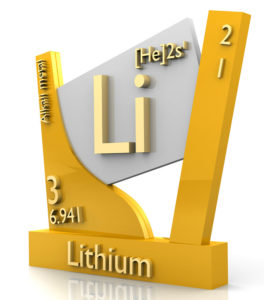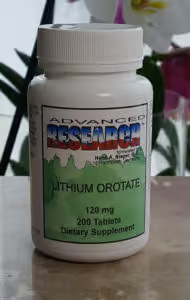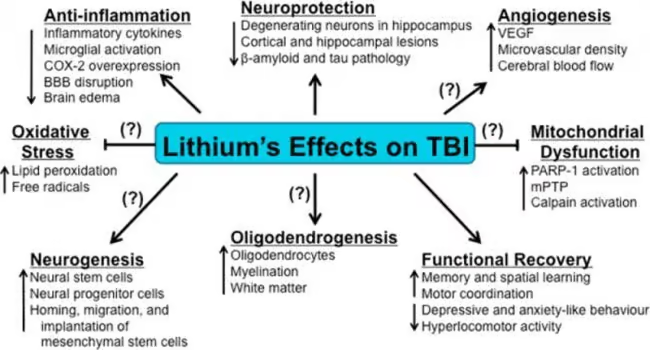Table of Contents
Key Takeaways
- Lithium is a natural alkali metal essential for reproductive health and overall wellness in humans and animals.
- Historically used for therapeutic purposes, lithium is studied for its neuroprotective and mood-stabilizing effects.
- Micro-dosing lithium through supplements like Lithium Orotate offers cognitive benefits such as mood balancing, promoting growth factors and neurogenesis, and brain protection.
- Adequate lithium intake from diet and water may help prevent mental and neurological diseases, while low levels can be associated with depression, anxiety, and memory decline.
- Lithium Orotate is a popular micro-dosing option that provides mood stabilization, neuroprotection, and cognitive enhancement without toxic side effects of higher doses.
Lithium is a soft, silvery-white alkali metal so reactive (it sparks when it touches water) that it’s not found in nature on its own. Instead, it’s found in mineral compounds and in mineral water.
Cosmologists believe that lithium was one of the 3 elements synthesized in the Big Bang.[i] So it’s been around for a long time.
Most of us associate prescription lithium with treating mental illnesses like bipolar disorder and mania (lithium carbonate). Or the lithium-ion battery in our phone. Which has a tendency to blow up occasionally.
Turns out that the anti-psychotic medication lithium isn’t even a drug. It’s actually a naturally occurring mineral. Lithium salts are part of the same family of minerals that include potassium and sodium.
As a nootropic, micro-dosing lithium provides some amazing anti-aging benefits. Recent research shows that low-dose lithium may also help slow the progression of neurodegenerative diseases like Alzheimer’s, dementia and Parkinson’s disease.
Low-dose lithium also helps neurogenesis and memory. And is a mood stabilizer.
Here we’ll investigate daily or frequent use of Lithium Orotate as a nootropic, and how it benefits cognitive health.
Lithium helps:
- Balance mood. Lithium calms mania (extreme highs and lows) by decreasing sensitivity of the post-synaptic norepinephrine receptor.[ii] And increases uptake of norepinephrine into synaptosomes. Preventing the release of this neurotransmitter. And lithium enhances the transport of Vitamin B12 and folate into brain cells.[iii] Affecting mood and aggression.
- Growth Factors. Lithium upregulates brain-derived neurotrophic factor (BDNF), nerve growth factor (NGF), neurotrophin-3 (NT3) and their receptors. And lithium stimulates the proliferation of stem cells in the brain. All boosting neurogenesis and assisting in repair from all types of brain injury.[iv]
- Neuroprotection. Lithium increases brain gray matter, increases DNA replication for neurogenesis, prevents apoptosis, increases N-acetyl-aspartate (NAA), inhibits beta-amyloid secretion and protects against damage once it’s formed, chelates aluminum, and protects against glutamate toxicity.
Overview
Lithium is an alkali mineral and one the trace elements considered essential for both animal and human reproductive health, and general health and wellness.
Discovered as a chemical element in 1817, lithium’s first recorded modern medical use was in 1871 for the treatment of mania.
But the use of lithium for therapeutic use goes back to ancient Greek and Roman times. People enjoyed soaking in alkali springs to help with physical and mental illness.
People have been using mineral springs for therapeutic use ever since. Lithia Springs in Douglas County, Georgia was so popular that people came for miles just to drink the water.
The Sweet Water hotel, a luxury 500-room resort was opened in 1887. And attracted famous authors, business people and prominent politicians who came for the spring’s health benefits. The name “Lithia” stems from water rich in lithium.
Studies from around the world have shown the critical health benefits of lithium. One study using data from 27 Texas counties from 1978 – 1987 found that rates of suicide, homicide and rape were significantly higher in counties whose drinking water contained little or no lithium.[v]
Another study of lithium levels in tap water in 18 municipalities in Japan showed standard mortality ratios lower in places with higher lithium levels.[vi]
Yet another study conducted in Texas in 2013 confirmed the original findings in that state. Drinking water samples from 226 counties found a correlation between lithium levels and suicide rates.[vii]
Researchers who conducted meta-analyses of lithium levels and public drinking water suggested “increasing lithium levels of drinking water could potentially reduce the risk of suicide, and justify administering lithium to tap water.”[viii]
An article in the Lancet in 1949 by John Cade is credited for the modern medical use of lithium as an effective treatment for manic psychosis.[ix]
The United States FDA approved high dose lithium carbonate and lithium citrate in 1970 for the treatment of bipolar disorder. Carbonic acid and citric acid are mineral carriers used to transport lithium throughout your body.
Doctors also prescribe lithium off-label for treating migraines, seizure disorders and psychosis usually after other treatments have failed.
But as we dig deeper into the most recently published research on lithium, we realize this trace element is essential for optimal health and brain function.
The lithium we get from our diet prevents many neurological and psychiatric problems. Micro-dosing lithium as a nootropic with a supplement like Lithium Orotate can help make up for the what we don’t get from our food and water.
Lithium is naturally available from fish, processed meat, milk, dairy products, eggs, potatoes and vegetables. Your typical dietary intake of lithium can range from 2 – 600 mcg. Amounts vary depending on where the food is grown.
How does Lithium work in the brain?
Lithium helps brain health and function in several ways. But two in particular stand out.
- Lithium stabilizes mood. Recent research has discovered that lithium’s mood stabilization effects may be due to its ability to boost the production of new brain cells (neurogenesis).
Lithium inhibits the enzyme glycogen synthase kinase-3β (GSK-3β). This inhibition upregulates brain-derived neurotrophic factor (BDNF), and insulin-like growth factor-1 (IGF-1) which stimulates neural stem cells to produce new neurons in the hippocampus.[x]
When neural stem cells produce new neurons in the hippocampus, mood and memory work as designed. But a breakdown in neurogenesis results in mood disorders.
Lithium has long been known to control mania and stabilize mood in bipolar patients. But it was not generally thought of as an antidepressant. Researchers in Tel Aviv provided the first evidence that inhibiting GSK-3β exerted a rapid antidepressant effect in mice.[xi]
Another team at Howard Hughes Medical Institute in Pennsylvania showed that feeding mice chow laced with low-dose lithium for 15 days produced a dose-dependent antidepressant effect.[xii]
Lithium induced gene transcription in the hippocampus, amygdala and hypothalamus. All areas implicated in depression, anxiety, bipolar disorder, autism and schizophrenia.
- Lithium protects your brain. Your brain cells are at constant risk of damage from exposure to toxins you encounter every day from food, air, water and your environment. And the excitotoxins produced by ordinary brain cell metabolism.
Glutamate plays a major role in the synaptic plasticity needed for learning and memory.[xiii] But over-activity of glutamate on its NMDA receptors causes neuron death and is implicated in Alzheimer’s, Huntington’s and Parkinson’s disease. Lithium inhibits this overactivity.[xiv]
Lithium also increases the production of a neuroprotective protein called bcl-2.[xv] Researchers maintain that lithium is the only “medication” that has been demonstrated to significantly increase bcl-2 in several brain areas.
Lithium has also recently been evaluated in preventing and treating traumatic brain injury. In a study conducted in 2014, Dr. Peter Leeds stated that lithium had “demonstrated robust beneficial effects in experimental models of Traumatic Brain Injury (TBI). These include decreases in TBI-induced brain lesion, suppression of neuroinflammation, protection against blood-brain barrier disruption, normalization of behavioral deficits, and improvement of learning and memory, among others.”[xvi]
How things go bad
In 1985, the United States EPA estimated that dietary intake of lithium from food in the USA varied from 0.6 to 3.1 mg per day.[xvii] For comparison, people who live in the Andes in Northern Argentina consume 2 to 30 mg per day, with 2 – 3 mg just from drinking water.[xviii]
As your dietary sodium and caffeine increases, so does lithium excretion in urine which increases your requirement for this essential trace mineral.
Your exposure to stress and toxins from things like mercury, aspartame, MSG, Bisphenol A (BPA) and other excitotoxins also raise cortisol and other stress hormones. Increasing your need for more water-soluble nutrients like B-vitamins, magnesium, zinc and lithium.
Low lithium levels are associated with …
↑ Depression and anxiety increase
↓ Memory and learning ability decline
↑ Insomnia increases
↑ Sensitivity to stress and chronic pain increase
↓ Natural healing processes decline
Adequate daily intake of lithium could help prevent many mental and neurological diseases due to this trace minerals effects on nervous system metabolism. And it’s anti-inflammatory and antioxidant effects.
Lithium Orotate benefits
The clinical research and studies on the neuroprotective benefits of lithium are so overwhelming, some scientists are beginning to ask “why isn’t everyone using lithium”?
Here’s a summary of how micro-dosing lithium using Lithium Orotate can benefit your brain.
- Inhibits apoptosis – lithium inhibits GSK-3 which has been linked to apoptotic cell death
- NMDA-receptors – lithium reduces glutamate induced toxicity mediated by NMDA-receptors which helps in mood disorders, Alzheimer’s, and other autoimmune and inflammatory diseases
- Neuroprotection – blocks the development of beta-amyloid tangles and plaque
- Neurogenesis – lithium promotes the increase of brain-derived neurotrophic factor (BDNF) needed for synaptic plasticity in learning and memory. Lithium also boosts nerve growth factor and glial-derived neurotrophic factor affecting learning, memory, mood and overall brain health[xix]
- Neuronal stem cells – lithium stimulates the stem cells needed to produce new neurons (neurogenesis)
- Stabilizes mood – lithium is known for providing a calming effect in healthy people as well as those dealing with depression, bipolar disorder, and mania
- Suicide prevention – adequate levels of lithium has been shown to reduce suicide risk in multiple studies worldwide
- Depression – lithium helps with treatment-resistant depression. In fact, lithium has been shown to improve the effectiveness of antidepressant medications
- N-acetyl aspartate (NAA) – lithium increases NAA which has been associated with higher IQ scores[xx] (i.e. lithium will make you smarter!)
The benefits of supplementing with lithium go far beyond just optimizing cognitive health. Lithium also helps decrease insulin resistance, helps in treatment of alcoholism and other addictions, supports bone health, balances your circadian rhythm and more.
How does Lithium Orotate feel?
My personal experience with Lithium Orotate has made me a believer in micro-dosing lithium. I’m Adult ADD and deal with mood swings from time to time.
If I’m going around the bend because something upset me, I take 5 mg of Lithium Orotate. Within 15 minutes my mood stabilizes and I feel normal again. Consistent use puts me in a happy mood.
Many others report you’ll feel the results taking a low dose of lithium quickly. But for some, the full effect can take anywhere from 1 to 3 weeks. Micro-dosing 5 – 10 mg of lithium daily results in consistent results within a month or two for some. I’ve experienced great results within a couple of days.
So if you lash out at people in anger, and don’t fully understand why you get so angry – it could be your lithium levels are low.
Many neurohackers with depression and anger issues notice results quickly. Within the first couple of days you should feel more calm, relaxed, and experience less stress.
Keep in mind that lithium at any dose is not for everyone. But if you get adequate lithium from your diet and water, and still experience some of the mood swings talked about in this review, you could be dealing with other issues. You should know within a couple of hours of supplementing with low-dose lithium if this supplement is for you.
For some, Lithium Orotate means feeling excited about life for the first time in a long time. Anxiety and social anxiety are no longer a problem. Life is more fun and enjoyable.
Some say Lithium Orotate works better than any prescription that they’ve ever tried to treat severe depression. It provides a nice, smooth mood balance without all the toxicity associated with mega-doses of lithium carbonate.
If you’re dealing with PTSD or mild insomnia, you may want to try Lithium Orotate. Focus could improve, racing thoughts diminish and motivation levels could increase. You’ll have more coping ability.
Lithium Orotate Clinical Research
Lithium Improves Memory
A study at McMaster University in Canada set out to determine the effects on hippocampus volume in 14 bipolar patients who received lithium therapy.
The researchers examined the effects of lithium on hippocampal volumes and memory performance and recall over 2 – 4 years. The patients had not received any type of medication prior to using lithium.
The study found increases in hippocampus volume over time. And evidence of improvement of verbal memory performance over the 4-year measurement period.
The researchers concluded that the results of the study were consistent with the literature stating the neuroprotective effects of lithium. And that long-term lithium treatment is associated with preservation of memory and recall due to increased hippocampus size.[xxi]
Lithium Increases Mood in Recovering Addicts
24 adults recovering from heroin or methamphetamine addiction participated in a study in San Diego. Group A received 400 mcg per day of lithium taken orally for 4 weeks. The placebo Group B naturally took a non-active placebo.
Subjects completed a mood test questionnaire containing questions about their ability to think, work, mood and emotions. For the lithium group, mood test scores increased steadily and significantly during the 4 week period.
The lithium group also reported significantly increased levels of happiness, friendliness and energy. Group B showed no improvement during the same period.
The researchers concluded that low-dose lithium provided a mood-improving and stabilizing effect.[xxii]
Lithium Orotate in the Treatment of Alcoholism
In this study, 42 alcoholic patients were treated with Lithium Orotate during alcohol rehabilitation in a private clinical setting for six months. The data was collected from clinical practice records for the 10 years following the initial study.
The patients received 150 mg of Lithium Orotate daily for six months along with calcium orotate, magnesium orotate, bromelain and essential phospholipids.
Ten of the patients had no relapse from 3 – 10 years. 13 patients stayed sober from 1 – 3 years. The remaining patients relapsed between 6 – 12 months.
The researchers concluded that Lithium Orotate therapy was safe in treating addiction with minor adverse side effects.[xxiii]
Lithium Orotate Recommended Dosage
Lithium retains a grim and undeserved reputation. Likely because it was originally associated with serious mental illness. And like most medications, lithium can produce serious side effects if not monitored properly.
Lithium carbonate or lithium chloride salts are typically prescribed for long-term control and to treat bipolar disorder at 900 – 1200 mg per day. The major problem with such high doses of lithium are some very serious and debilitating side effects.
For nootropic use, I suggest Lithium Orotate which typically contains only 5 mg of elemental lithium. Lithium Orotate is orotic acid combined with lithium.
Orotic acid reportedly makes the lithium more bioavailable than lithium carbonate. The lithium is released once it crosses the blood-brain barrier. So you’ll get the benefits of lithium supplementation while avoiding the toxic side effects of high doses.[xxiv]
Lithium Orotate supplements recommended dose is 5 mg two or three times per day. See “Where to buy Lithium Orotate” for more on lithium amounts in nootropic supplements.
Many neurohackers use Lithium Orotate only as needed. For example, when feeling anxious or in the middle of a mood swing.
For someone with bipolar disorder or manic disorders, increasing to two 5 mg tablets up to 3-times per day may be more effective.
Naturopathic doctors suggest stacking 1,000 mg of Omega-3 and 400 UI of Vitamin E (as mixed tocopherols) each day you’re using Lithium Orotate.
Lithium Orotate Side Effects
Do not confuse Lithium Orotate with lithium carbonate. The carbonate version of lithium is only available by prescription and comes with a host of side effects.
Prescription lithium used in excess has been shown to have adverse effects on thyroid and kidney function. This is NOT a problem when supplementing with Lithium Orotate when used at recommended dosages.
Lithium Orotate at low doses is non-toxic and lab tests are not required to monitor your lithium levels because it does not show up in blood samples.
Lithium Orotate should not be used if you are dealing with significant renal or cardiovascular disease, severe dehydration or sodium depletion, or if you’re taking diuretics or ACE inhibitors.
Do not use Lithium Orotate if you are pregnant or breast-feeding.
You should check with your doctor if you are on any medication before using Lithium Orotate.
Where to Buy Lithium Orotate
Mother Nature has already put the antipsychotic “drug” lithium in drinking water. And you get some lithium from food depending on where it’s grown.
Supplemental Lithium Orotate typically comes in 120 or 130 mg capsules or tablets containing 5 mg of elemental lithium.
I recommend and use Click for Advanced Research Lithium Orotate(Amazon) which was formulated by Dr. Hans Nieper.
Nootropics Expert Recommendation
 Lithium Orotate 5 mg 2 or 3 times per day.
Lithium Orotate 5 mg 2 or 3 times per day.
I recommend using Lithium Orotate as a nootropic supplement if you’re feeling anxious or depressed. Or experiencing mood swings.
Your body does not make lithium on its own. So you must get this essential trace mineral from your diet, or a supplement like Lithium Orotate.
Lithium combined with orotic acid makes Lithium Orotate which readily crosses the blood-brain barrier, and you should feel its effects within 15 – 20 minutes of taking it.
Lithium Orotate is especially effective if you’re feeling stressed, or mentally overworked. Your brain uses lithium faster and it needs to be replaced. Which you can do by using Lithium Orotate.
Lithium Orotate is great if you are ADHD because lithium calms the hyperactivity in your brain.
Lithium supplements do not change your state of consciousness. It simply helps bring you back to feeling normal and happy.
I suggest trying Lithium Orotate as a nootropic supplement with your first dose at 5 mg and see how you react. If you experience no negative reaction, try another 5 mg in a few hours. Up to 3 – 5 mg doses per day.
You’ll likely experience the full benefits of Lithium Orotate within a week of consistent use.
I recommend and use Click for Advanced Research Lithium Orotate(Amazon)










Join The Discussion - 865 comments
Sandhya
October 23, 2020
How long we can use Lithium Orotate safely with dosage 10mg if it is providing good results ?
David Tomen
October 26, 2020
Sandhya, you can use 10 mg Lithium Orotate daily for the rest of your life if it’s working for you.
Ana
September 26, 2020
Hi, I have been taking Lithium orotate for explosive intermittent disorder, 5-10 mg. But without any result. What else I can try? This is ruining my life.
Thank you
David Tomen
September 28, 2020
Ana, this disorder may be caused by serotonin depletion: https://pubmed.ncbi.nlm.nih.gov/22544009/. Instead of Lithium Orotate, you may want to try L-Tryptophan and see if that helps.
Ana
October 5, 2020
Thank you very much! Could you recommend me a dose?
David Tomen
October 5, 2020
Ana, the usual dose to start with L-Tryptophan is 500 mg before bed. You use it before bed because it helps make serotonin which goes on to make melatonin. If you used it earlier in the day it will likely make you sleepy.
Ali
September 11, 2020
Hi David,
When i take even 2,5 mg of Lithium Orotate i immediately feel calm and my anxiety/depression dissapears, but I also feel very unmotivated and zombie like sluggish.
FYI I have adhd and dont take any stim medication, so do you think that it could have something to do with my brain being low in stimulants?
David Tomen
September 11, 2020
Ali, ADHA is typically a problem with dopamine and norepinephrine signaling and the associated neurotransmitter levels.
Lithium decreases the sensitivity of the post-synaptic norepinephrine receptor. https://pubmed.ncbi.nlm.nih.gov/2836750/
Deb
August 21, 2020
I recently was admitted to a emergency stabilization unit of a psychiatric hospital following a very extended period of the worst insomnia I have ever experiences in my life, that combined with the isolation due to Covid led me to a bad place and I took steps to get myself some help so I didn’t do something stupid is my utter state of exhaustion and anxiety. One of the psychiatrist there was originally from Canada where they do things a lot different that they do in America and she had mentioned Lithium Ororate as an OTC supplement to try. It had been recommended I purchase the 120mg version (with the 5MG elemental) I decided to start much lower and purchased a 5mg version. It appears to be helping me sleep substanially better (although I am not 100% sure if it alone is the reason). I have also been taking 10mg of valium at night that I had been given at my release. I have in the past occasionally taken something similar (valium, klonopin) for short periods that did help with sleep but often didn’t help and nothing like the difference I have seen since adding the lithium Orotate. I wanted to ask if itching may be a possible side effect of taking lithium orotate? I have been taking it at for about 6 days now at a very low dose. (5mg) I was taking twice a day and have now cut back to just at night because I suspect the itching is due to taking this. I have seen it in 1mg, 2mg, 5mg and 120mg and have though about possibly buying a lower dose to try because honestly having tried SO SO many things over the years for sleep I really don’t want to have to stop taking this due to itching. So I wanted to see if you have heard of this as a side affect and see if you had any recommendations or thoughts on this. Thanks so much
David Tomen
August 21, 2020
Deb, “itching” is not one of the know side effects of Lithium Orotate. Is there any niacin in your supplement?
Every Lithium Orotate supplement I’ve seen contains 5 mg elemental lithium and the rest of the capsule or tablet is orotic acid.
May just change the supplement you are using. This is the one I use and recommend: https://amzn.to/2COdf4p
Dvorah
August 17, 2020
Hello David, I have a very urgent question concerning dosage o lithium orotate for many decades of bipolar, very deep and long depressions.
Do you think I should take more than 20 mg a day to boost the effects of the lithium? Up to what dose can/ should I go up to, taking into consideration the facts I wrote you above? Right now I am taking 15 mg per day for one week. I would appreciate hearing from you as soon as possible. Thank you so much. You seem very reliable.
David Tomen
August 17, 2020
Dvorah, the maximum safe dose of Lithium Orotate is 15 mg per day. If you are considering anything above that I highly recommend working with a doctor who understands this nootropic.
Samantha
August 15, 2020
Hi David,
I’ve been dealing with PTSD for a couple years now, along with severe anxiety and mild-moderate depression. I recently bought some lithium orotate 5mg and wondering if it would be ok to take with 5 htp? I currently take l-theanine for my anxiety and occasionally GABA if I’m really stressed out. I also have two toddlers on the autism spectrum (ages 2 & 4) and my 2 year old we believe also has ADHD as well. Would LO be safe for her to take at the 5mg? I read that it was safe for kids to take but, haven’t tried it yet.
David Tomen
August 16, 2020
Samantha, Lithium Orotate should be safe for you. And it’s not contraindicated with 5-HTP. But don’t think it would be suitable for a child. You’d need to check with a doctor first about that.
And have you seem my research and recommendations for PTSD? https://nootropicsexpert.com/treating-post-hurricane-ptsd-with-nootropic-supplements/
Jason
July 30, 2020
Lithium orotate does help my psychosis, it gives me more focus and mental clarity but if I take 5mg twice a day I will have sinus problem. The problem is not solved just reduced.
I would recommend a good b complex plus extra niacin for psychosis problem. It seems to get rid the source of the problem.
Nicolas Rocha
August 2, 2020
Had a question i want to take lithium orotate. Just took my last dose of antibiotics last night is it ok to take this today.
David Tomen
August 2, 2020
Yes it is.
Angelina
July 13, 2020
Hey David,
I bought some lithium orotate.
I take magnesium, calcium with k2, lamictal (moodstabilidor), GABA and 5HTP, sun-theanine. And want to add lithium in this mix. Is it ok to mix 5mg of lithium with all that and especially the 5HTP?
Morning I take dexamphetamine 20 mg for adhd during the day I take – vitamin a, a Compunding vitamin for undermehtylation which include a lot of B vitamins and mythionine + magnesium. I take iron, omega 3 From algae, l-theanine l, lysine, and a thyroid vitamin complex. I want to do add 5mg of lithium in the morning as well? Is that okay?
David Tomen
July 13, 2020
Angelina, you should be fine with Lithium Orotate. And here’s a suggestion …
Help dexamphetamine do a better job by supporting it with the right nootropics. You’re almost there but need a little tweaking with dosages and timing and some extra dopamine by following this protocol: https://nootropicsexpert.com/best-nootropics-for-adhd-add/
Angelina
July 21, 2020
Thanks heaps. Basically, the dexamphetamine works well. I just dont take too much of it because the crash of it makes me really depressed so I adjusted the dose lower. Also I am wanting to protect my brain and not allow the dexamphetamine to damage anything long term. I’ve got heaps of l-tyrosine but stopped taking them because I didn’t want to make my brain overly produce more dopamine. But I may need some advice as to what to take to balance out the dexamphetamine crash, and some days I don’t take the dex as well so I give myself breaks from it, also on days of not taking it wondering if I can take acetyl – l tyrosine? Or something else to balance out serotonin and dopamine or even to help with adhd without the dex, ultimately I would love to take nootropics that would help with adhd without having to take the dex.
David Tomen
July 21, 2020
Angelina, I’ve used the stack described in this post: https://nootropicsexpert.com/best-nootropics-for-adhd-add/ every single day for the last 12 years. And I use it 3-times per day with thrice daily doses of Ritalin. With no brain damage and no crash in the afternoon. Tens of thousands are using this stack too with or without prescription stimulants with great success. You may want to join us and try it too.
Hannah Fowler
July 23, 2020
Hi David! My Mom has bipolar and Alzheimer’s I recently increased her Lithium Orotate to 30mg per day. She takes 20mg am and 10-15mg pm. It seemed to work really well for a few weeks but she has had some increased anxiety. Is this just part of the Alzheimers or should I be increasing or decreasing the Lithium Orotate dosage? Thanks!
David Tomen
July 24, 2020
Hannah, it could be due to the Lithium Orotate dosage because some people are much more sensitive to these supplements than others. Only way to find out if it’s that is to reduce her Lithium dosage for 2 or 3 days and see if that helps. It it doesn’t then you know it’s likely part of Alzheimer’s.
Here’s a tip: use the search function top right above the main menu on Nootropics Expert and search for the keyword “Alzheimer’s”. You’ll get two pages of results. Some of those may be “false positives” because that keyword was included as a side effect or result of something going wrong because you were low in some nutrient. But others will be backed by clinical studies showing that nootropic supplement’s efficacy in treating Alzheimer’s.
Hannah Fowler
July 24, 2020
Ok. Thank you!